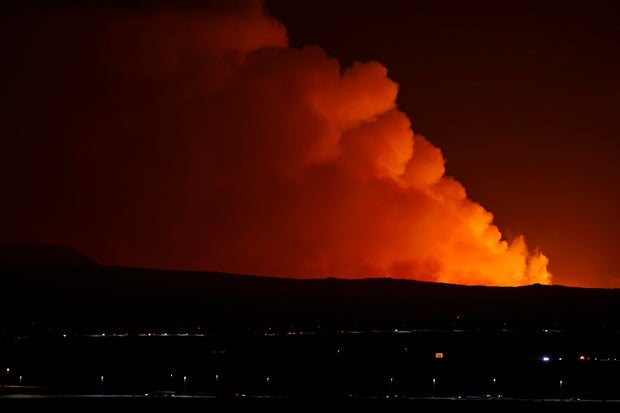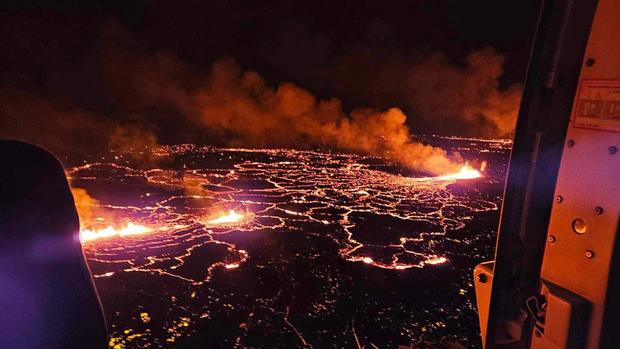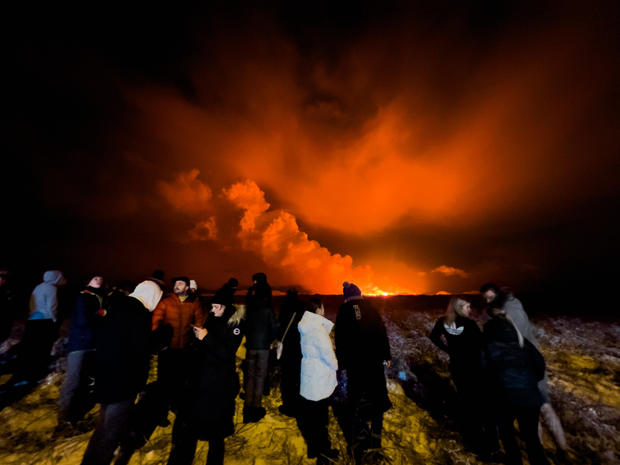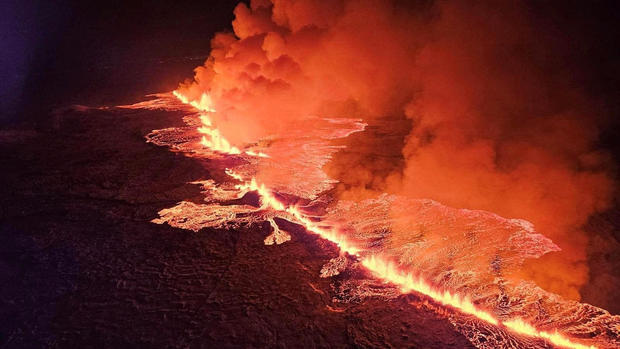A volcanic eruption started Monday night on Iceland’s Reykjanes Peninsula, turning the sky orange and prompting the civil defense to be put on high alert.
The eruption appears to have occurred about 2 miles from the town of Grindavík, the Icelandic Meteorological Office said. Webcam video from the scene appears to show magma, or semi-molten rock, spewing along the ridge of a hill.

Civil Protection of Iceland/Handout via REUTERS
Iceland’s Department of Civil Protection and Emergency Management confirmed the eruption shortly after 11 p.m. local time and said it had activated its civil protection emergency response.
“The magma flow seems to be at least a hundred cubic meters per second, maybe more. So this would be considered a big eruption in this area at least,” Vidir Reynisson, head of Iceland’s Civil Protection and Emergency Management told the Icelandic public broadcaster RUV.
Iceland’s foreign minister, Bjarne Benediktsson said on X, formerly known as Twitter, that there are “no disruptions to flights to and from Iceland and international flight corridors remain open.”

Brynjar Gunnarsson / AP
“We are monitoring the situation closely,” Vincent Drouin, a geophysicist at the Icelandic Meteorological Office, told CBS News, adding that the eruption is “much bigger” and longer than the volcano’s previous eruption.
In November, police evacuated the town of Grindavik after strong seismic activity in the area damaged homes and raised fears of an imminent eruption.
Thousands of earthquakes struck Iceland that month, as researchers found evidence that magma was rising to the surface, and meteorologists had been warning that a volcanic explosion could occur any time on the Reykjanes Peninsula.
Drouin said the amount of lava created in the first hour will determine whether lava will eventually reach Grindavik. A sustained eruption would be “very problematic” as it would partially destroy the town, he said.
An even bigger concern is a power station in the area, Drouin said. If that station is damaged, it would affect the flow of water and electricity to large parts of the peninsula.
Magnus Tumi Gudmundsson, a scientist who flew over the site on Tuesday morning onboard a coast guard research flight, told RUV that he estimates twice as much lava had already spewed than the entire monthlong eruption on the peninsula this summer.
Gudmundsson said the eruption was expected to continue decreasing in intensity, but that scientists have no idea how long it could last.
“It can be over in a week, or it could take quite a bit longer,” he said.

ICELAND POLICE DEPARTMENT/Anadolu via Getty Images
Grindavik, a fishing town of 3,400, sits on the Reykjanes Peninsula, about 31 miles southwest of the capital, Reykjavik and not far from Keflavik Airport, Iceland’s main facility for international flights. The nearby Blue Lagoon geothermal resort, one of Iceland’s top tourist attractions, has been shut at least until the end of November because of the volcano danger.
“The town involved might end up under the lava,” said Ael Kermarec, a French tour guide living in Iceland. “It’s amazing to see but, there’s kind of a bittersweet feeling at the moment.”

/ Getty Images
Iceland sits above a volcanic hot spot in the North Atlantic and averages an eruption every four to five years. The most disruptive in recent times was the 2010 eruption of the Eyjafjallajokull volcano, which spewed huge clouds of ash into the atmosphere and grounded flights across Europe for days because of fears ash could damage airplane engines.
Experts say the current eruption is not expected to release large quantities of ash into the air.

- In:
- Volcano
